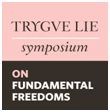Defending Human Rights through Social Media: Challenges in Promoting Democratic Change
Historical archive
Published under: Stoltenberg's 2nd Government
Publisher: Ministry of Foreign Affairs
Speech/statement | Date: 21/09/2011
“... this is what social media is: tools and multipliers. For Human Rights Defenders of today these tools offer a much more effective way of bringing out information – about rights as well as about violations”, Foreign Minister Jonas Gahr Støre said in his opening remarks at the “Trygve Lie Symposium” in New York 21 September 2011.

The Minister based his address on the following talking points
(check against delivery):
- Let me start by taking you a few years back:
o In 2007 monks in Burma took to the streets to demand respect for human rights.
o In 2009 people all over Iran demonstrated against what they saw as a flawed election process. - Via mobile phones and You-Tube, short films and photographs of both these two – otherwise very different – situations where aired directly, documenting the demonstrations and the crackdown by the Myanmar as well as the Iranian Government.
- The news got out, bypassing the reach of the repressive regimes.
- Today the ICT technology has taken us even further and the Arab Spring demonstrated to us, not only the documenting power, but also the incredibly mobilising effect of social media.
- ICT technology is no longer limited to convey report from monitors and witnesses. Via cheap cell phones with internet access it was available for the demonstrators themselves, to connect and to mobilize.
- In Tunisia and in Egypt it proved to be an important tool in ousting the authoritarian regimes. Social media was instrumental in bringing people together and on to the streets, as well as in bringing the reactions from the government out to the international community.
- But let me stress:
- Neither Facebook nor Twitter brought down Mubarak or Ben Ali. People did. People who bravely took to the streets – unarmed apart from a conviction that time was eventually on their side. That justice should prevail.
- What they did was to claim their right to express themselves, to assemble and to protest in peaceful ways. Old fashioned rights – but with sharp, new tools.
- Because this is what social media is: tools and multipliers. For Human Rights Defenders of today these tools offer a much more effective way of bringing out information – about rights as well as about violations.
- And it is of course this efficiency that triggers repressive regimes, to censor and to curb the use of social media, to spread disinformation, to monitor dissidents and to infiltrate their networks. ICT technology offers a range of possibilities for authorities to limit the freedom of speech.
- Today around 60 countries are exercising some form of internet censorship:
- They filter, they infiltrate, they manipulate and they harass. An increased surveillance capacity similarly increases the vulnerability of human rights defenders: For human rights defenders the insecurity of digitally stored or communicated information via social media is becoming a major problem.
- And so social media is a double-edge sword; as it is a tool it can be used both for good and for bad. It is only as good as the cause it is being used to further.
- And as people can use social media to mobilise and protest against authorities, to promote human rights and democratization, so too can they use social media to spread hatred and incite violence. (Re: Terrorist attacks in Norway 22 July 2011).
- But regardless the complexity of internet freedom, the main principle prevails: As the UN Special Rapporteur on freedom of opinion and expression, Mr. Frank La Rue, in his report to the Human Rights Council on Internet Freedom this June, underlined: “the same rights that people have offline – freedom of expression, freedom to seek information, freedom of assembly and association, amongst others – must also be protected online”.
- I invite the foreign ministers on this panel to discuss how we can maintain the freedom of expression on the internet and help strengthening the work of Human Rights Defenders.
- And I am looking forward to hear and learn from the experiences of the distinguished human rights activists and representative from the social media industry present today, on this issue.
*****
- Next year, the UN Special Rapporteur on freedom of opinion and expression will focus on the topic of hate speech and incitement to discrimination, hostility and violence – not least on the internet and in social media, of course. We will support him in this important work.
- During this General Assembly Norway will, again, be main sponsor of a resolution on Human Rights Defenders. We are the proud supporter of the important efforts by Mdm Margaret Sekaggya, UN Special Rapporteur on Human Rights Defenders.
- We recently updated our Guidelines on assistance to Human Rights defenders. These guidelines are an important tool for the Ministry and all Norwegian embassies on how to assist Human Rights Defenders all over the world the very best way.
- We have also distributed the Guidelines through the IFEX network; the largest global network of 95 freedom of expression organisations.
- o Hopefully, the Guidelines will be used by Human Rights defenders, journalists and users of social media who face difficult or dangerous situations when they express their opinions and defend human rights.
More information about the symposium, including webcast